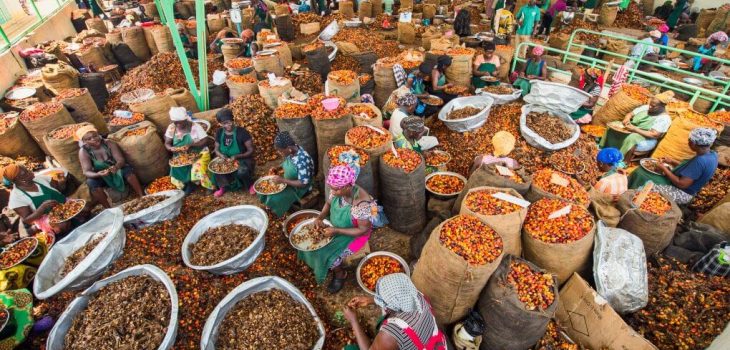Read something about us here.
Dr. Bronner’s and its sister company Serendipalm in Ghana opened the world’s first certified organic and fair trade palm oil production facility in 2009. The reason? After unsuccessfully searching for sources of organic and fair trade palm oil, Dr. Bronner’s decided to build its own project in Ghana.
Serendipalm is a member of Dr. Bronner’s Serendi family of smallholder farmer projects. Dr. Bronner’s started these projects in 2005, with the goal of ensuring a supply of raw materials for its products that came from verifiably fair and sustainable sources—and to show other companies that “it can be done.” All Serendi projects purchase their raw materials from smallholder organic farmers instead of from large plantations.
The “Serendi” in the company name is derived from the word “serendipity,” which means “finding something valuable or delightful when you are not looking for it”—a motto that applies to all Serendi projects.
Serendipalm produces its fair and organic palm oil in Asuom in Ghana’s Eastern Region (see map).
The difference between Serendipalm’s palm oil production and that of our major competitors becomes obvious as soon as you set foot on the project. They grow oil palms on large monoculture plantations, often on recently cleared forest land. The palm fruits are processed in central oil factories that are poorly integrated into local communities—often with disastrous results for people, animals, and the environment. Serendipalm, on the other hand, only buys palm fruits from local organic smallholder farmers, whom we helped switch to organic cultivation while assisting them in continuously improving soil fertility and yields. The typical size of an Serendipalm oil palm farm is 2–3 hectares (5-7.5 acres)—very small in comparison with conventional plantations that may cover an area of 10,000 hectares. At our oil mill in Asuom, we use simple processes that call for a great deal of manual labor. In this way, we have created many jobs—over 250 in total. To remain cost-competitive, we also emphasize work planning, good communication, continuing education and ongoing improvement of production efficiency. In many ways, Serendipalm is a training organization out of necessity—which results in great joy, as well as the occasional headache.
Serendipalm’s yearly production, 500 to 1,000 tons of organic palm oil, represents a fraction of the produced quantities on larger projects. But small is often better, and Serendipalm’s philosophy of fair and eco-friendly production enables it to integrate closely into the community and have positive effects on the Asuom district, both as an employer and by means of community development projects. As a rule, major palm oil producers cannot afford to do this, even though many of them have good intentions.
Serendipalm’s success shows that “good” fair trade and organic palm oil is possible. We are delighted that there are now larger projects around the world that produce organic palm oil with a social mandate, and we are collaborating with them in disseminating our concept.
Finally, Serendipalm and Dr. Bronner’s are active players in the heated debate in Europe on the subject of palm oil—giving talks, issuing publications, and helping to draw up proposals for politicians.
Finally, Serendipalm and Dr. Bronner’s are active players in the heated debate in Europe on the subject of palm oil—giving talks, issuing publications, and helping to draw up proposals for politicians.
